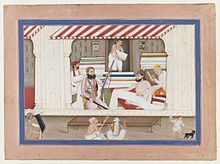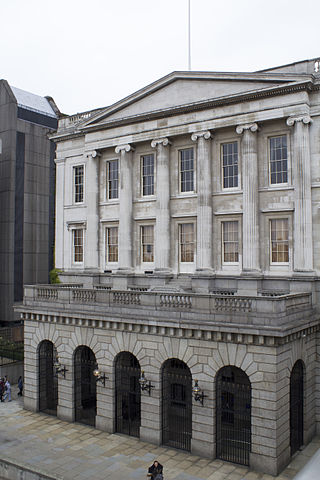
A livery company is a type of guild or professional association that originated in medieval times in London, England. Livery companies comprise London's ancient and modern trade associations and guilds, almost all of which are styled the "Worshipful Company of" their respective craft, trade or profession. There are 111 livery companies in total. They play a significant part in the life of the City of London, not least by providing charitable-giving and networking opportunities. Liverymen retain voting rights for the senior civic offices, such as the Lord Mayor, Sheriffs and Common Council of the City Corporation, London's ancient municipal authority with extensive local government powers.
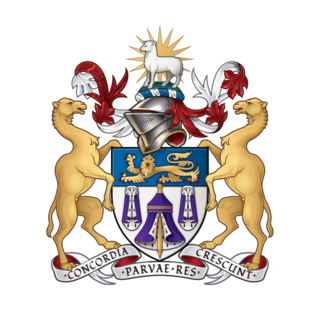
The Worshipful Company of Merchant Taylors is one of the 111 livery companies of the City of London.
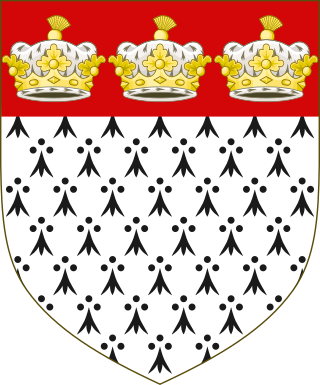
The Worshipful Company of Skinners is one of the Livery Companies of the City of London. It was originally an association of those engaged in the trade of skins and furs. It was granted Royal Charter in 1327.
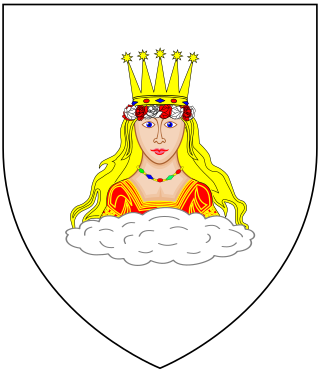
The Mercers' Company, or the Worshipful Company of Mercers, is a livery company of the City of London in the Great Twelve City Livery Companies, and ranks first in the order of precedence of the Companies.

The Worshipful Company of Haberdashers, one of the Great Twelve City Livery Companies, is an ancient merchant guild of London, England associated with the silk and velvet trades.

In British English, a haberdasher is a business or person who sells small articles for sewing, dressmaking and knitting, such as buttons, ribbons, and zippers; in the United States, the term refers instead to a men's clothing store that sells suits, shirts, neckties, men's dress shoes, and other items.

Draper was originally a term for a retailer or wholesaler of cloth that was mainly for clothing. A draper may additionally operate as a cloth merchant or a haberdasher.

The Levant Company was an English chartered company formed in 1592. Elizabeth I of England approved its initial charter on 11 September 1592 when the Venice Company (1583) and the Turkey Company (1581) merged, because their charters had expired, as she was eager to maintain trade and political alliances with the Ottoman Empire. Its initial charter was good for seven years and was granted to Edward Osborne, Richard Staper, Thomas Smith and William Garrard with the purpose of regulating English trade with the Ottoman Empire and the Levant. The company remained in continuous existence until being superseded in 1825. A member of the company was known as a Turkey Merchant.
John Slany, Slaney or Slanie, etc., was an English merchant and ship builder of Shropshire origins who became Master of the Merchant Taylor's Company in 1620, and was the first and only Treasurer of the Newfoundland Company, chartered in 1610.
Mercery (from French mercerie, meaning "habderdashery" or "haberdashery" initially referred to silk, linen and fustian textiles among various other piece goods imported to England in the 12th century. Eventually, the term evolved to refer to a merchant or trader of textile goods, especially imported textile goods, particularly in England. A merchant would be known as a mercer, and the profession as mercery.
Francis Levett (1654–1705) was a Turkey Merchant of the City of London who in partnership with his brother Sir Richard Levett, Lord Mayor of London, built a trading empire, importing and distributing tobacco and other commodities, mainly from the Levant. He served as Warden of the Worshipful Company of Mercers.

Sir Richard Levett (1629–1711) was an English merchant and politician who was elected Lord Mayor of London in 1699. Born in Ashwell, Rutland, he moved to London and established a pioneering mercantile career, becoming involved with the Bank of England and the East India Company.
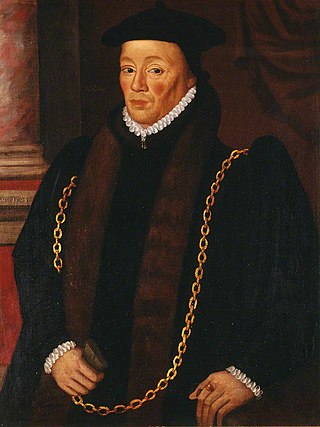
Sir William Garrard (1518–1571), also Garrett, Gerrarde, etc., was a Tudor magnate of London, a merchant citizen in the Worshipful Company of Haberdashers, who became alderman, Sheriff (1552–1553) and Lord Mayor of London (1555–1556) and was returned as an MP for the City of London. He was a senior founding officer of the Company of Merchant Adventurers to New Lands in 1554/55, having been involved in its enterprises since the beginnings in King Edward VI's time, and for the last decade of his life was one of its permanent governors. He worked hard and invested largely to expand English overseas trade not only to Russia and the Levant but also to the Barbary Coast and to West Africa and Guinea.

Blackwell Hall in the City of London was the centre for the wool and cloth trade in England from mediaeval times until the 19th century. Cloth manufacturers and clothiers from provincial England brought their material to Blackwell Hall to display and sell it to merchants and drapers.

Sir Thomas Smythe was an English merchant, politician and colonial administrator. He was the first governor of the East India Company and treasurer of the Virginia Company from 1609 to 1620 until enveloped by scandal.
Sir William Chester was one of the leading English Merchants of the Staple and Merchant Adventurers of the mid-16th century, five times Master of the Worshipful Company of Drapers, Lord Mayor of London in the year 1560–61 and Member of Parliament for the City of London. He should not be confused with his contemporary, William Chester, merchant of Bristol, M.P.

The Shrewsbury Drapers Company was a trade organisation founded in 1462 in the town of Shrewsbury, Shropshire, England. The members were wholesale dealers in wool and later woollen cloth. The Company dominated the trade in Welsh cloth and in 1566 was given a regional monopoly in the Welsh Wool trade. In the seventeenth century the trade had difficulties particularly during the English Civil war and then further declined in the eighteenth century with the industrialisation of cloth production and the improvement of transport infrastructure. This made it practical for merchants from Liverpool and elsewhere to travel into Wales and purchase cloth directly from the producers. The Reform Acts of the early nineteenth century took away the power of the trade guilds and the trade ceased. Since that time the Shrewsbury Drapers Company has survived and continues as a charity that runs almshouses in Shrewsbury.
Sir Nicholas Woodroffe (1530–1598) was a London merchant of the Worshipful Company of Haberdashers, who, through the English Reformation, rose in the Alderman class to become a Master Haberdasher, Lord Mayor of London and Member of Parliament for London. Through the complexities of his family's relationships, and the position and security which they afforded, he lived to establish his family among the armigerous houses of late Elizabethan Surrey.

Thomas Aldersey was an English merchant, haberdasher, member of Parliament and philanthropist. A contemporary description placed him among the "wisest and best merchants in London", and he was particularly known for his efforts to set the Protestant colony of Emden on a secure trade footing. His charitable works included the establishment of a free grammar school at his birthplace of Bunbury in Cheshire.
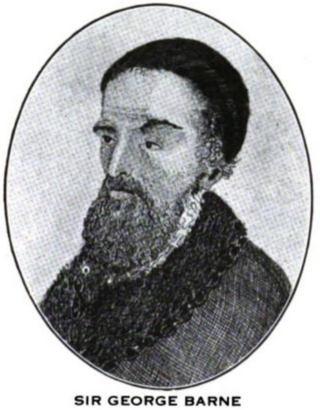
Sir George Barne was an English businessman in the City of London who was active in developing new trading links with Russia, West Africa and North America, far outside what had been traditional English trading patterns. Created a knight in 1553, he served as Sheriff of London and Lord Mayor of London. He was the father of Sir George Barne and grandfather of Sir William Barne. Nicholas Culverwell was probably a nephew.
